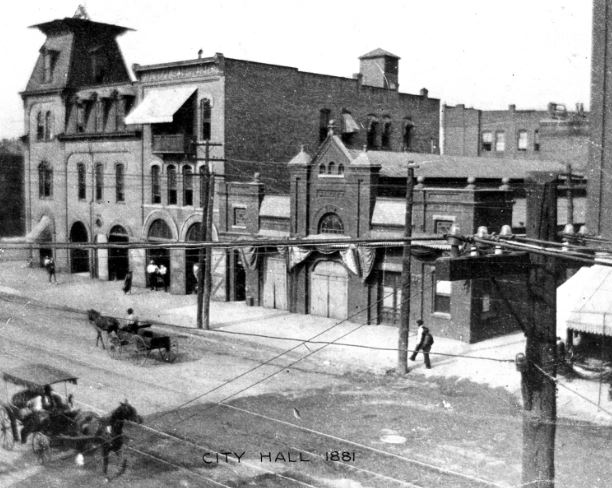The Birmingham Times
1871 –City of Birmingham founded; now the state’s most populous city, Birmingham was founded at the crossing of two rail lines near one of the world’s richest deposits of minerals.
1873 — Birmingham becomes seat of Jefferson County.
–First Colored Baptist Church founded.
—Birmingham particularly hard hit by cholera due to the lack of urban infrastructure and the poor housing conditions. At least 128 people died from cholera, which struck in the height of summer and persisted for several weeks. The outbreak caused about half of Birmingham’s 4,000 residents to flee.
1874 – Birmingham Iron Age newspaper in publication.
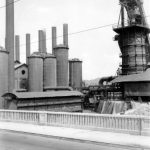
1882 — Sloss Furnace begins operating.
1885 — Birmingham Barons baseball team originally established as Birmingham Coal Barons.
1888 – Evening News and Birmingham Age-Herald newspapers in publication.
1890 — The Penny Savings Bank, founded by the Rev. William Reuben Pettiford in Birmingham, opens becoming the first black-owned and black-operated financial institution in Alabama.
1893 — Cathedral of Saint Paul built. St. Mark’s School opens.
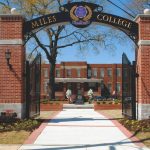 1898 — Miles College founded by the Colored Methodist Episcopal Church. It was chartered as Miles Memorial College, in honor of Bishop William H. Miles.
1898 — Miles College founded by the Colored Methodist Episcopal Church. It was chartered as Miles Memorial College, in honor of Bishop William H. Miles.
1902 — Woodward Building, construction completed on the first of four steel-frame skyscrapers that would make up Birmingham’s “Heaviest Corner on Earth.”
1903 – Social worker Carrie A. Tuggle opens the Tuggle Institute and School, the first orphan home in Alabama for African-American boys. The Institute operated until Tuggle’s death on November 5th, 1924 and was later renamed Tuggle Elementary School in 1936.
1904 — Vulcan Statue, the world’s largest cast-iron statue, created as Birmingham’s entry in the St. Louis World’s Fair, was sculpted by Giuseppe Moretti.
1907 — Tennessee Coal, Iron and Railroad Company acquired by United States Steel Corporation.
1909 — City expands to include Ensley, North Birmingham, Pratt City, Woodlawn.
–Birmingham Terminal Station and Empire Building constructed.
1912 – John Hand Building constructed.
1913 – City Federal Building constructed.
1914 — Birmingham’s Lyric Theatre established as one of the first in the South where black and white audiences could see the same show for the same price, though blacks sat in an isolated section with inferior accommodations
1918 — Birmingham College and Southern University merged to establish Birmingham-Southern College.
1922 – WAPI radio begins broadcasting.
1923 – Traffic lights installed.
1925 — The Pittsburgh of the South, Birmingham is the largest cast iron and steel producer in the Southern U.S.; – WBRC radio begins broadcasting.
1927 – Alabama Theatre opens. 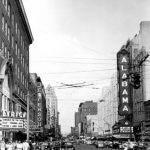
1929 – Thomas Jefferson Hotel built.
1936 — Local Steel Workers Organizing Committee formed
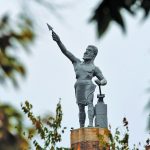
–Vulcan statue erected atop Red Mountain.
1941 — World War II. The demand for steel during the war brought Birmingham out of the Great Depression.
1949 – WAPI-TV and WBRC-TV (television) begins broadcasting.
1950 — Birmingham Post-Herald newspaper in publication.

1951 — Birmingham Museum of Art opens. It is currently home to one of the finest collections in the Southeast, with extensive holdings from around the globe dating from ancient to modern times.
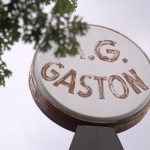 1954 — A.G. Gaston Motel, founded by entrepreneur and activist A.G. Gaston to provide higher class service to black visitors.
1954 — A.G. Gaston Motel, founded by entrepreneur and activist A.G. Gaston to provide higher class service to black visitors.
1955 – Birmingham Zoo opens.
1956 — The home of Birmingham minister and civil rights leader Fred Shuttlesworth is bombed. Although the structure is severely damaged, Shuttlesworth emerges uninjured.
–During a mass meeting at Birmingham’s Sardis Baptist Church, Shuttlesworth and other local black ministers establish the Alabama Christian Movement for Human Rights (ACMHR). Founded in response to the State of Alabama’s recent ban on the NAACP, which lasted eight years, ACMHR was central to the civil rights movement in Birmingham.
–The Freedom Riders arrive at the Greyhound bus terminal in Montgomery where they are attacked by an angry mob. The Freedom Ride, an integrated bus trip from Washington D.C., through the Deep South, was formed to test the 1960 Supreme Court decision prohibiting segregation in bus and train terminal facilities.
1956 — Alabama Symphony Orchestra changes name to Birmingham Symphony Orchestra.
1963 — After previously establishing the ACMHR and the Southern Christian Leadership Conference (SCLC), Shuttlesworth invites Rev. Martin Luther King, Jr. to Birmingham to lead what becomes the Birmingham Campaign for Desegregation.
–King writes Letter From Birmingham Jail. 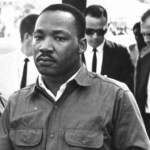
–Sixteenth Street Baptist Church bombed killing four young girls in an attack against the Civil Rights Movement and humanity.
–Birmingham Botanical Gardens open.
–The Birmingham Times newspaper founded
1966 — The University of Alabama at Birmingham, the University of Alabama extension center and the School of Medicine merged to create a four-year university. Now a public research university and medical center that is the state’s largest employer.
1966 – Oscar Adams Jr. becomes the first African American to join the Birmingham Bar Association.
1968 – Arthur Shores appointed to the Birmingham City Council, making him the first African-American to serve as a councilman.
1969 – Birmingham Terminal Station demolished.
1974 — J. Richmond Pearson and U.W. Clemon first African Americans elected since Reconstruction to the Alabama State Senate.
1979 — Richard Arrington Jr. elected as the first African-American mayor of Birmingham. Arrington serves in that post for nearly 20 years, until his resignation in July 1999.
1980 – Oscar Adams Jr. appointed to the Alabama Supreme Court, making him the first African-American justice to hold that office.
1984 — J. Mason Davis becomes the first African-American president of the Birmingham Bar Association. He is also the first minority adjunct professor at The University of Alabama School of Law School, serving from 1972 to 1997
1986 — Reuben Davis and Chris McNair elected to the County Commission, the first district by district election, and are the first African-Americans to serve on the commission
–South Trust Tower, Birmingham’s largest skyscraper, built. It has since become Wachovia Tower; Wells Fargo Tower and now Shipt Tower.
1989 – AmSouth-Harbert Plaza built in downtown Birmingham.
1990 — Birmingham Islamic Society formed.
1991 – Carole Smitherman appointed to become the first African-American woman to serve as a circuit court judge in Alabama
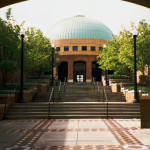 1992 — Birmingham Civil Rights Institute opens at Kelly Ingram Park in the Civil Rights District
1992 — Birmingham Civil Rights Institute opens at Kelly Ingram Park in the Civil Rights District
1993 — Alabama Jazz Hall of Fame opens.
1998 – An F-5 tornado with winds estimated at more than 260 mph at its peak would tear through Tuscaloosa and Jefferson Counties killing 32 people, injuring 250 and destroying 1,000 homes.
1999 – Bernard Kincaid elected mayor
2002 — Shelia Smoot elected first black female Jefferson County Commissioner
2003 — Helen Shores Lee becomes the first African-American woman to serve as judge on the Jefferson County Circuit Court.
2003 — The Barber Motorsports Park, an 880 acre, multi-purpose racing facility located on the eastern fringes of Birmingham opens. It is built by George Barber and includes the Barber Vintage Motorsport Museum, which has been named “World’s Largest Motorcycle Museum” by the Guinness World Records.
–Kincaid re-elected mayor
2005 — Condoleezza Rice, Birmingham native named U.S. Secretary of State.
–Birmingham Post-Herald newspaper ceases publication.
2007 – Larry Langford elected mayor
2008 — The national subprime mortgage crisis and Great Recession plunges the county’s debt to junk bond status because of failure of the derivative markets. This triggers penalties and higher interest rates for Jefferson County sewer debt. The county begins technical default. Bond insurers sue.
–Jefferson County and creditors attempt to reach a settlement of the $3.14 billion sewer debt, but any deal would need to erase $1 billion or more of that debt.
2009 – Carole Smitherman becomes Birmingham’s first African-American female mayor.
–Roderick Royal becomes mayor
2010 – William Bell elected mayor
 —Railroad Park, 19-acre park opened, becomes a catalyst for revitalization in downtown Birmingham
—Railroad Park, 19-acre park opened, becomes a catalyst for revitalization in downtown Birmingham
2011 — After the Alabama Supreme Court upholds a judge’s ruling on the occupational tax, the county again puts hourly workers on a 32-hour workweek and shuts down four satellite courthouses to save $21 million annually.
–Jefferson County puts 547 workers on administrative leave without pay, but restores the 40-hour workweek for those who remain. Officials announce that roadside mowing and most paving will stop. Sheriff Mike Hale says deputies no longer will respond to traffic accidents.
–A massive storm in April, causing numerous powerful tornadoes rips through the southeastern United States with 250 people killed in Alabama, including 20 people in Jefferson County communities of Pleasant Grove (10), Concord (6), Cahaba Heights (1), Pratt City (1), Forestdale (1), and McDonald Chapel (1).
–The County Commission in November votes 4-1 to file the largest municipal bankruptcy in U.S. history.
–Terri Sewell becomes U.S. representative for Alabama’s 7th congressional district.
2012 — Cooper Green Mercy Hospital downsized. The Jefferson County Commission votes 3-2 to close the inpatient care unit and emergency room at Cooper Green following weeks of debate and protests from community leaders who have begged the county to continue operating the facility for the sick poor.
2013 — The County Commission unanimously approves the sale of the county’s nursing home.
2014 — Jefferson County emerges from bankruptcy in December after closing on about $1.8 billion in new sewer warrants used to pay creditors.
–The University of Alabama at Birmingham announces it will end its football program. After intense pressure, the program makes a comeback three years later.
2015 – The International World Game Executive Committee selects Birmingham for the 2021 World Games (moved to 2022 because of COVID-19). Birmingham beats Lima, Peru and Ufa, Russia for the event and supporters of Birmingham say landing the event could have a $256.5 million economic impact to the region.
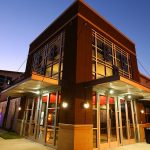 — Negro Southern League Museum opens with permanent exhibits telling the story of African-American baseball, 7,050 square feet for special events, space for a rooftop restaurant with a terrace overlooking Regions Field, and a gift shop.
— Negro Southern League Museum opens with permanent exhibits telling the story of African-American baseball, 7,050 square feet for special events, space for a rooftop restaurant with a terrace overlooking Regions Field, and a gift shop.
–The Birmingham Times newspaper sold to the Foundation for Progress in Journalism
2016 — Lynneice Washington elected District Attorney for the Bessemer Cutoff, the first African-American DA in the state of Alabama.
–Theo Lawson named first African American Jefferson County attorney.
–Representative Terri Sewell introduces legislation leading to Birmingham Civil Rights National Monument designation by presidential proclamation one year later.
–The completely renovated Lyric Theater in downtown reopens with a three-day Vaudeville-style variety show featuring local performers.
2017 – Randall Woodfin elected, becomes city’s youngest mayor in over 120 years.
–John Henry joins the Jefferson County Commission Finance Department and becomes the county’s first black chief financial officer.
–The Pizitz Building formally opens. Located on the corner of 2nd Avenue and 19th Street North, in the heart of Birmingham’s historic retail and theater district, it features The Pizitz Food Hall, two restaurants, 143 multifamily residences, modern co-working office space named Forge and newly opened Sidewalk Film Center + Cinema.
2018 — Danny Carr and Mark Pettway elected the county’s first black district attorney and first black sheriff, respectively.
–Highlands Bar & Grill wins prestigious James Beard Award for Most Outstanding Restaurant under the direction of Chef Frank Stitt
2019 — Walter Gonsoulin named the first permanent African American superintendent of the Jefferson County School System
 2020 — A 4,300 square-foot A.G. Gaston Boys and Girls Club clubhouse opens on the grounds of the CrossPlex campus in western Birmingham.
2020 — A 4,300 square-foot A.G. Gaston Boys and Girls Club clubhouse opens on the grounds of the CrossPlex campus in western Birmingham.
–Felicia Rucker-Sumerlin named the first female Deputy Chief in the 200-year history of the Jefferson County Sheriff’s Office.
–COVID-19 pandemic sweeps the globe including, Birmingham, Jefferson County and Alabama completely disrupting lives around the world and killing millions.
–Long lines form at polling places around the city for a historic presidential election as Democrat Joe Biden defeats Republican Donald Trump in the U.S. Presidential election.
2021 – January Woodfin hospitalized and later released with COVID pneumonia
–-Woodfin pardons 15,000 misdemeanor marijuana convictions
–Woodfin creates city’s first ever Civilian Review Board
–Alabama Agriculture and Mechanical defeats Alabama State University in the Magic City Classic which had been delayed for six months because of COVID-19.
Source: The Birmingham Public Library; Bhamwiki; The Birmingham Times

